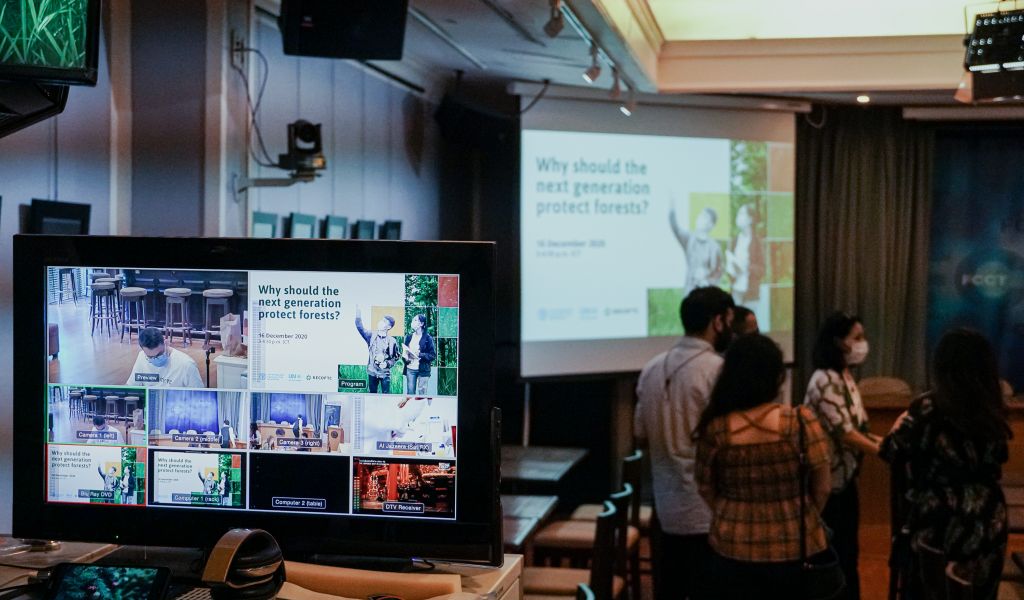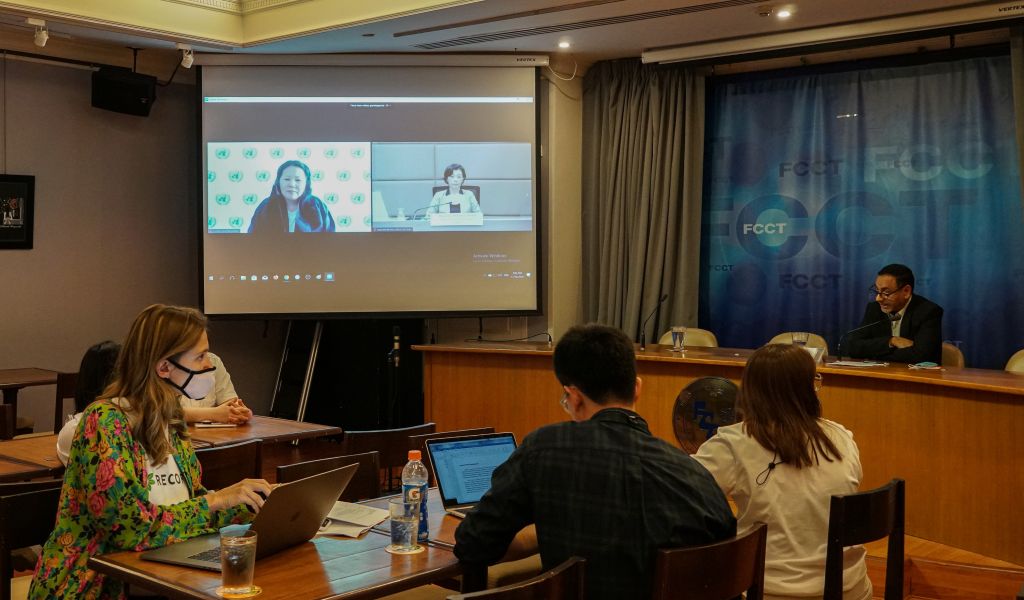Young people key to protecting forests

As a celebration of the 2020 International Day of Forests, RECOFTC, the Food and Agriculture Organization (FAO) of the United Nations and the United Nations Environment Programme (UNEP) hosted a youth panel to explore why the next generation should protect forests.
The event usually takes place in Thailand each year in March. But this year, due to the COVID-19 pandemic, the panel discussion was held on 16 December and live streamed on RECOFTC’s Facebook page.
The winners of a student video competition “Can protecting forests prevent pandemics?” launched earlier this year as part of the celebrations were also announced during the event. High school and college students from Bhutan, India, Indonesia, Japan, Malaysia, Nepal, Philippines and Thailand submitted 19 videos.
The link between the environment and pandemics
Protecting and restoring forests and biodiversity are essential to overcoming the impacts of climate change and preventing the spread of zoonotic diseases.
In her opening remarks, Kazumi Ikeda-Larhed, Chief Administrative Support Group for the FAO Regional Office for Asia and the Pacific, said that forests hold about 80 percent of the world’s terrestrial biodiversity.
“Biodiversity is under serious threat from deforestation, forest degradation and climate change,” said Ikeda-Larhed. “These threats to forests make us highly vulnerable to pandemics such as COVID-19.”
Dechen Tsering, Regional Director and Representative for Asia and the Pacific at the UN Environment Programme, said that 60 percent of known infectious diseases and 75 percent of emerging infectious diseases are zoonotic.
“Human expansion into wild spaces, along with increasing exploitation of species, is bringing us closer to animals and the diseases they harbour,” said Tsering. “Now more than ever we need to recognize and celebrate the role of forests in fighting global pandemics.”
Tsering said that 10 million hectares of forest are destroyed every year, increasing the risk that pandemics like COVID-19 will return in new, potentially more dangerous forms.
Chandra Silori, Deputy Executive Director of RECOFTC, said that growing up in a small village in India taught him the importance of the relationship between people and the environment.
“My family and community lived connected to the land,” Silori said. “How we treat the land and forest is how the land and forest will treat us. We must protect the environment, and in doing so, the planet will share its bounty in food, fuel and other resources we need to live.”
Youth take charge on the world environmental stage
Young people have the potential to be strong advocates for healthy, flourishing forests that support the environment and the people who depend on them.
“Forests are high on young people’s climate agenda,” said Tsering. “We’ve all watched youth across the world raising their voices for the planet, demanding that governments and corporations make stronger commitments to fight the climate and diversity crisis.”
She praised young activists for their resilience and mature approach to the environment.
“Your involvement in shaping the global environment and economic agenda is brave and the world is listening. Please keep voicing your concerns and calling for real action,” Tsering said.
Ikeda-Larhed added that the Asia-Pacific region is home to 60 percent of the world’s youth population, who hold the power and potential for making positive change. “Through assertive actions, our youth are a potent force for ensuring important developments in how we look at and treat forests,” she said.
Young people looking for ways to make a tangible environmental impact have options to help them achieve their goals.
For Nanticha Ocharoenchai (Lynn), writer, filmmaker and founder of Climate Strike Thailand, activism begins with awareness and education about environmental and social issues.
“Once we understand the value that comes with nature we will naturally want to protect it, without feeling that policies are imposed on us,” she said during the panel discussion. “This is important to get people to act on climate at all. I started my activism from being able to experience nature, not only by learning about it. We should get people to experience nature if we want to see them act.”
Video contestants enthusiastic for change
The winners of the video competition were announced at the end of the panel discussion. All entries illustrated the passion that young people in the Asia-Pacific region have for environmental activism.
High school category winners
First place: Jangkanipa, Zehra and Chynna, Panyarat High School, Thailand
Second place: Milan from Wells International School, Thailand
Third place: Teeraphat, Patima and Thitira from the Global English School, Thailand
Most popular: Siravit, Pattaranan and Yanitta from Panyarat High School, Thailand
University category winners
First place: Tenzin, Royal University of Bhutan, Bhutan
Second place: Roshan and Ravi, Institute of Forestry, Nepal
Third place: Arlene, Megha and Karuna, Asian Institute of Technology, Thailand
Most popular: Mohammed, Rani Lakshmi Bai Central Agricultural University, India
###
RECOFTC’s work is made possible with the support of the Swiss Agency for Development and Cooperation (SDC) and the Swedish International Development Cooperation Agency (Sida).



